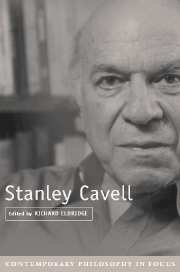Book contents
- Frontmatter
- Contents
- List of Contributors
- Stanley Cavell
- 1 Introduction: Between Acknowledgment and Avoidance
- 2 Stanley Cavell and Ethics
- 3 The Names of Action
- 4 Stanley Cavell's Vision of the Normativity of Language: Grammar, Criteria, and Rules
- 5 Aesthetics, Modernism, Literature: Cavell's Transformations of Philosophy
- 6 A Second Primavera: Cavell, German Philosophy, and Romanticism
- 7 Cavell on American Philosophy and the Idea of America
- 8 “Disowning Knowledge”: Cavell on Shakespeare
- 9 Cavell on Film, Television, and Opera
- Brief Annotated Bibliography of Works by and about Stanley Cavell
- Index
6 - A Second Primavera: Cavell, German Philosophy, and Romanticism
Published online by Cambridge University Press: 08 January 2010
- Frontmatter
- Contents
- List of Contributors
- Stanley Cavell
- 1 Introduction: Between Acknowledgment and Avoidance
- 2 Stanley Cavell and Ethics
- 3 The Names of Action
- 4 Stanley Cavell's Vision of the Normativity of Language: Grammar, Criteria, and Rules
- 5 Aesthetics, Modernism, Literature: Cavell's Transformations of Philosophy
- 6 A Second Primavera: Cavell, German Philosophy, and Romanticism
- 7 Cavell on American Philosophy and the Idea of America
- 8 “Disowning Knowledge”: Cavell on Shakespeare
- 9 Cavell on Film, Television, and Opera
- Brief Annotated Bibliography of Works by and about Stanley Cavell
- Index
Summary
ON STYLE OF THOUGHT
Cavell is not one whose thought can be fixed easily with univocal determinacy. This is a thinking always on the move, and it moves more by perplexity and questioning than by arriving at assertoric claims, where finally rest at last offers itself. This is part of Cavell's great attraction and difficulty. Attraction: the subtlety of his interrogations lures one toward a moment of truth, less determined in conclusive propositions than in the question that now at last can be put and that, in being put, gives us access to a light that, just in being stayed briefly, also as quickly passes. Difficulty: there seems no place to lay one's head, so to say, and one is left to wonder if, in fact, there was that brief access of light, which after all now seems more a new perplexity than any perplexity dissolved or problem solved. To anyone who insists on a more settled univocity in philosophical argumentation, there will be cause enough here for chewing the carpet. And yet there is nothing excessively studied in this, as if it were the pose of unsettling us that Cavell struck, rather than in fact offering us access to that place of unsettling where a different thinking might catch fire.
To say more univocally what cannot quite be so said: there is something of art in the philosophical writing of Cavell that draws water from a well whose secret spring still remains underground.
- Type
- Chapter
- Information
- Stanley Cavell , pp. 143 - 171Publisher: Cambridge University PressPrint publication year: 2003
- 1
- Cited by



